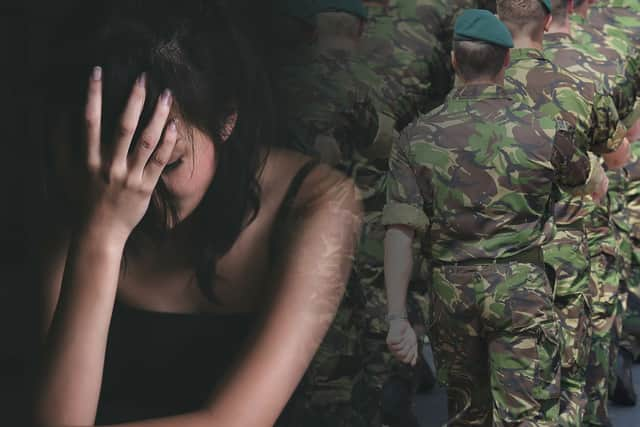Armed Forces: 14% of female personnel report sexual harassment - measures the MoD has pledged to take
and live on Freeview channel 276
Calls have been made for for the Armed Forces to “radically adapt” its approach to sexual harrassment - after a survey revealed 14% of female personnel had reported experiencing it.
The figure for women subjected to sexual harassment in the last year compared to less than 1% of men, according to the Ministry of Defence study.
Advertisement
Hide AdAdvertisement
Hide AdThe work of those serving in the military has been highlighted during Armed Forces Week, which draws to a close on Sunday.
But what’s been said about sexual harrassment in the forces, and what’s being done to tackle it?


What were the results of the survey?
The Armed Forces Continuous Improvement Survey is an annual survey which looks at a number of areas and was sent to a sample of almost 30,000 military personnel with more than 9,000 responding.
In a section about fairness at work it stated: “Over one in ten (12%) personnel report that they have been subject to bullying, discrimination or harassment in the last 12 months, unchanged since this question was first asked in 2015.
Advertisement
Hide AdAdvertisement
Hide Ad“Separately 14% of all female personnel report being subject to sexual harassment in a Service environment in the last 12 months, compared to less than 1% of male personnel.”
The report went on to say that of those subjected to bullying, discrimination or harrassment, the majority - 93% don’t make a complaint.
The report said: “The main reasons why personnel do not make a formal written complaint continue to be: not believing anything would be done if a complaint was made (56%) and believing that it might adversely affect their career (51%). Of those who made a formal complaint (less than 1% of all personnel), seven in ten are dissatisfied with the outcome of their complaint.”


What’s been said about sexual harassment in the forces?
Alan Collins, whose father and other relatives served in the forces, said the perception of the army had changed over the last 50 years and it was now very much at arms length from society.
Advertisement
Hide AdAdvertisement
Hide AdThe solicitor is a partner with the abuse team at Hugh James Solicitors and military sex abuse claims is among his area of expertise, he said: “That separation is probably to the detriment of society and to HM Forces, and may at least in part explain the concerning levels of sexual harassment of women.
“The armed forces are very traditional and rightly proud of their traditions, but we must recognise given what we know about sexual harassment that this can help mould mindsets. This is not to detract from tradition, but we have to understand how it can influence different aspects of service life.”
Those who have suffered from harrassment may be reluctant to make a complaint after the trauma of the incident itself, as well as a fear of not being believed.
Other factors include fear of reprisals from colleagues and worries over the potential for it to have a negative impact on career progression and promotion.
Advertisement
Hide AdAdvertisement
Hide AdMr Collins said: “Those who have been harassed are rightly proud of their service and make it clear that they have not sought special treatment or any kind of preferment because of their sex.
“What they complain about is attitudes and treatment which would not be tolerated in civilian life. It is as if the maturity that exists today for example in our places of work is lacking in the forces.
“The MoD would say no doubt that sexual harassment has no place in the armed forces, but that is missing the point which is that it should not be happening. Of course, sexual harassment can occur anywhere if the environment is there to enable it, but we all know in our workplaces what is not acceptable and the consequences if we step out of line.”
Meanwhile, his colleague Danielle Vincent, a senior associate with the firm’s abuse team, spoke of some of the challenges female personnel experiencing harassment might face, saying: “Males historically hold predominantly higher roles in the armed forces.”
Advertisement
Hide AdAdvertisement
Hide AdMs Vincent said the perception of a “boys club” culture makes going against it “frightening and isolating”.
She said: “Allegations of abuse may need to be reported to senior male positions, which ultimately may deter a female personnel officer on the fear she will be deemed sensitive or unable to take a joke.”


What steps are needed to change things?
Those who complain of sexual harassment and assault, both male and female often point to common themes such as the encouragement of poor behaviour and it being perceived in some way acceptable.
Mr Collins said any preventative education needed to be meaningful, with one-off talks having limited value.
Advertisement
Hide AdAdvertisement
Hide AdHe said: “What is needed is every single person who enters HM Forces must receive hard-hitting training on what comprises sexual assault, what do to reduce the incidence of sexual assault, options for reporting sexual assault and their responsibilities to ‘protect their mates’ as both potential victims and perpetrators.
“The training has to be repeated and up dated to minimise the risk of complacency.”
He added: “More thought needs to be given to reporting and confidentiality. An option may be to allow a complaint to be made without naming those involved, but this would enable the complaint to receive support, and for the service concerned to take an objective approach as to what may be happening on the ground.
“I think it’s important that the realities are recognised and, in my experience, they are, but the approach needs to radically adapt to bring about change.”
Advertisement
Hide AdAdvertisement
Hide AdMr Collins went on to say: “That culture of respect for our colleagues and understanding of acceptable behaviour is diminished in the armed forces because in part of that isolation from society. That has to change.”
While Ms Vincent said more openness was needed, adding: “There is often embarrassment, shame or blame that a survivor will suffer.
“Openness within the armed forces and encouragement to disclose any abuse must be paramount, clear complaints procedures to tackle and investigate allegations should be in place so this is not lost in the chain of command, training on sexual harassment should be provided and willingness to provide support especially to junior force employees.”
What has the MoD said?
The MoD said it is taking a number of measures to prevent sexual harassment.
Advertisement
Hide AdAdvertisement
Hide AdIt added that it is working to prevent it through cultural change across Defence as well as aiming to create an environment where people can call out unacceptable behaviour. Among the measures it has taken is to make active bystander training mandatory.
Other measures include raising awareness and trying to build trust in the complaints system as well as providing good quality support to people affected.
An independent BHD (bullying, harassment and discrimination) helpline run by professionals available 24/7 has been set up. While, a programme of upskilling Diversity and Inclusion Advisers on sexually unacceptable behaviour has begun.
Mandatory consent training at basic training establishments has also been introduced.
Advertisement
Hide AdAdvertisement
Hide AdAn MoD Spokesperson said: “We are clear that all forms of unacceptable behaviour, including sexual harassment and bullying, have no place in our Armed Forces and anyone convicted of a sexual offence will be discharged. We are improving reporting mechanisms for sexual offences so personnel feel safe in raising issues and confident allegations will be acted on.”
Comment Guidelines
National World encourages reader discussion on our stories. User feedback, insights and back-and-forth exchanges add a rich layer of context to reporting. Please review our Community Guidelines before commenting.
